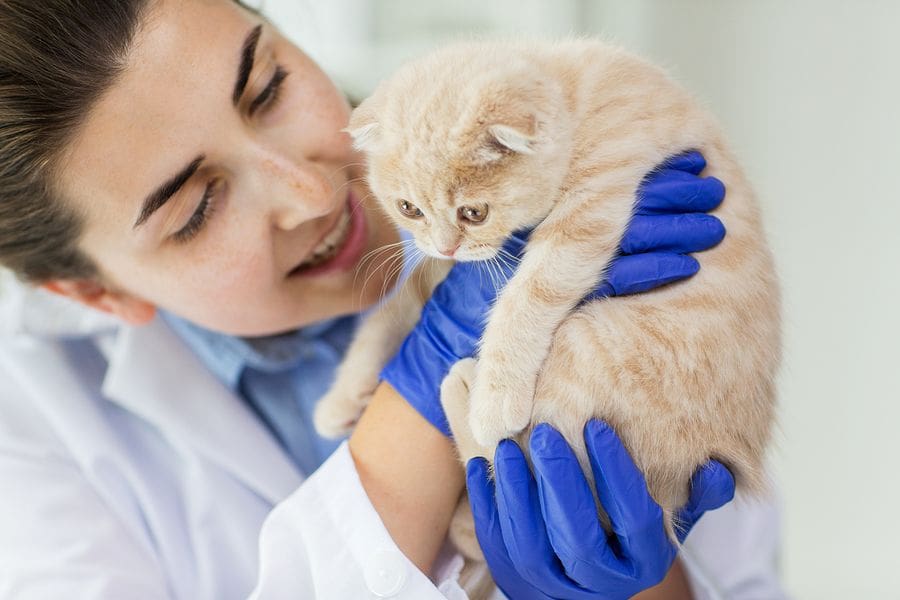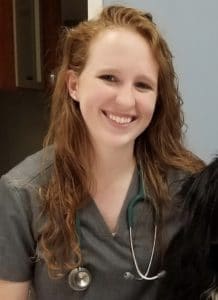

“Veterinarians are just in it for the money.” People think that euthanasia is the hardest part of being a vet. I think being told “you’re only in it for the money” is the hardest part. Nothing quite tears at your soul like a comment such as that.
Especially after spending so many years of hard work and accumulating obscene amounts of debt to be able to do what vets do, simply for love of animals.
I decided that I wanted to become a veterinarian when I was eight years old. Whenever I would go to the animal hospital for my family’s pet appointments, I would eagerly tell the doctor that I would like to be a vet one day.
Most of the time they would raise their eyebrows and say, “Well, don’t do it for the money.” Undeterred, I worked hard in school and never wavered in my dream.
I was accepted to a state university with a decent scholarship and did everything I could to make myself an attractive applicant for veterinary school.
No In-State Education Options
The day I received my acceptance letter to Tufts University’s School of Veterinary Medicine, tears of joy streamed down my face. I was from Rhode Island, so, with no in-state options for veterinary school, Tufts was the only place where I would be able to commute from home in an effort to save money during graduate school.
Like all veterinary schools for out of state students, tuition was expensive. But this was my dream! Plenty of people did it every year; I’m sure I could too. The money I had saved by going to a cheaper undergraduate university seemed like water droplets in the ocean of debt I quickly acquired.
As vet school trudged on, with weekly exams, eight hours of lecture per day, and then onto clinical year with sleepless nights on-call, my anxiety about student loans began to fester.
Mentors from a previous generation told me not to worry about it. “Just pay your loans off as fast as possible and you’ll be just fine!” My parents echoed a similar sentiment. After exploring a little on the government’s student loan website, I realized that to pay off my $300,000 in student loans as fast as possible, in a standard 10-year repayment program, my payments would be over $3,300 per month. I panicked.
That was almost $40,000 a year! That would amount to more half of my income if I was lucky enough to find a decent job right after graduation!
Student Loan Planner®’s Calculator
While taking breaks from studying for my licensing board exams, I researched student loan repayment options and stumbled upon the student loan planner’s calculator. I learned about income-based repayment and how it is certainly the best option for people in my position. Even after paying income tax on what I’ll likely be forgiven in 20 years, I’ll pay less in total by using Pay as You Earn when compared to the Standard 10-year Repayment.
I was sure to file taxes during my last year of veterinary school to make it easy to apply for income-based repayment as soon as I graduated. I could deal with spending 10% of my income on student loans much easier than 50% of my income.
Then I started telling anyone who would listen about student loans. It felt like taboo to inquire to other people’s amount of debt, but so many veterinary students are misinformed about the best options for repayment. The majority of interns choose to defer their loans which only allows interest to build up without counting any valuable months towards a repayment plan.
Lots of my friends said they prefer not to think about student loans. I understood how daunting the debt could be, but it was essential to start thinking about it before that first bill was to arrive just a few months after school was over.
I graduated in May of 2018 and started working in a small animal general practice hospital in Rhode Island about a month later. I consolidated my loans as soon as possible after graduation, putting an end to the automatic 6-month grace period and started making payments of next to nothing based on my 2017 income.
I also opened an investment account with Betterment and started putting $1000 a month away to begin preparing for the income tax “bomb” when my loan forgiveness kicks in.
When my loan payments increase after my income is reassessed over the next couple of years, I might not be able to keep up that pace of saving, but I figured while I’m not putting any real money towards student loans at the moment, that is the best use of my income in terms of preparing for the future.
Better Financial Situation: Focus on My Passion
Now, that I feel a little more secure about my financial situation and have the tools to manage it intelligently, I am able to focus on my passion for veterinary medicine. I can continue to absorb as much knowledge and experience as possible in my first few months as a practicing doctor and I’m having an amazing time.
I am lucky to have excellent mentors, reasonable hours, and clients that truly want the best for their pets. I strongly believe that focusing on wellness, especially early in your career is so important to overall happiness.
I am saddened to read articles about the depression and suicide rates among veterinarians. Between the compassion fatigue, burnout, and emotional distress that can come with the job, the last things vets need is a financial strain as well. If you are able to manage debt in a way that leaves you able to afford the necessities and spend money on things that make you happy, that is infinitely better than throwing over half of it into student loan payments.
Don't Give Up
I encourage veterinarians, vet students, and pre-vet students to take an honest look at their finances and their long-term goals. You do not need to give up on your passion due to the skyrocketing tuition and wages that simply cannot keep up, but you need to be smart and research your options. Some of my classmates are going into specialties that will likely make a salary where they will be able to afford standard repayment programs.
Some have incredible family support or scholarships for their exceptional achievements. Others have found jobs at non-profits that may earn them tax-free loan forgiveness in 10 years. But an awful lot of them are like me, someone with the goal of being a successful general practitioner veterinarian, who happened to rack up six figures of student loan debt on the way, and needs a reasonable way out.
Refinance student loans, get a bonus in 2024
| Lender Name | Lender | Offer | Learn more |
|---|---|---|---|

|
$500 Bonus
*Includes optional 0.25% Auto Pay discount. For 100k or more.
|
Fixed 5.24 - 9.99% APR*
Variable 6.24 - 9.99% APR*
|
|

|
$1,000 Bonus
For 100k or more. $300 for 50k to $99,999
|
Fixed 5.19 - 10.24% APPR
Variable 5.28 - 10.24% APR
|
|

|
$1,000 Bonus
For 100k or more. $200 for 50k to $99,999
|
Fixed 5.19 - 9.74% APR
Variable 5.99 - 9.74% APR
|
|

|
$1,050 Bonus
For 100k+, $300 for 50k to 99k.
|
Fixed 5.44 - 9.75% APR
Variable 5.49 - 9.95% APR
|
|

|
$1,275 Bonus
For 150k+, $300 to $575 for 50k to 149k.
|
Fixed 5.48 - 8.69% APR
Variable 5.28 - 8.99% APR
|
|

|
$1,250 Bonus
For 100k+, $350 for 50k to 100k. $100 for 5k to 50k
|
Fixed 5.48 - 10.98% APR
Variable 5.28 - 12.41% AR
|
